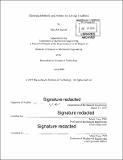Choosing methods and metrics for design feedback
Author(s)
Steindl, Riley M.
Download1130062121-MIT.pdf (1.066Mb)
Other Contributors
Massachusetts Institute of Technology. Department of Mechanical Engineering.
Advisor
Maria Yang.
Terms of use
Metadata
Show full item recordAbstract
Collecting feedback is an invaluable part of the design process because it helps inform useful and effective changes to products. With a multitude of different methods for gathering feedback and metrics for evaluation, it can be difficult to select the method and/or metrics that will provide the most useful feedback for a given stage of design. There is currently no condensed guide for selecting methods and metrics for feedback on the bases of stage of design, effort level, and data type. This study filled this gap through a literature review of 9 academic papers related to design evaluation methods and metrics. Following review, the information in these papers was analyzed to establish how evaluation methods and metrics relate to different stages of design, different data types, and relative effort levels. The result is description of the relationships between stage of design and suitability, evaluation method and data type, evaluation method and effort level, and evaluation metric vs data type. In all, this study provides useful information for designers to use when selecting the right evaluation methods and metrics to collect feedback on their designs.
Description
Thesis: S.B., Massachusetts Institute of Technology, Department of Mechanical Engineering, 2019 Cataloged from PDF version of thesis. Includes bibliographical references (pages 18-19).
Date issued
2019Department
Massachusetts Institute of Technology. Department of Mechanical EngineeringPublisher
Massachusetts Institute of Technology
Keywords
Mechanical Engineering.